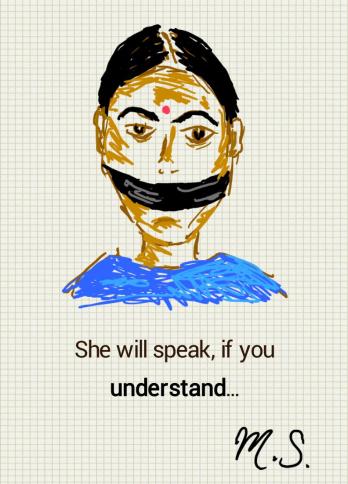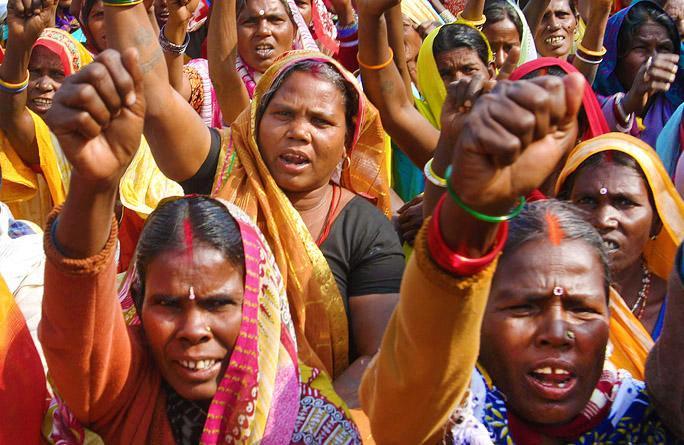
By Monica Sarkar
‘Eve teasing’. It’s such a cute, endearing term, isn’t it? Almost sounds like a child’s game, like ‘Hyde and Seek’ or ‘Kiss Chase’.
Well, it’s not. It’s a sugar-coated expression commonly used in India for the sexual harassment of women; invading their personal space as they walk down the street; and heckling, amongst other less pleasing-to-the-ear but truthful terms.
Since the horrific Delhi gang-rape and murder of a 23-year old woman, many Indian women have come forward with their stories of the perils of being a woman in India. As a British-born Indian woman who has visited India many times, I can also share the same tales.
Men aggressively – or subtly – brushing past me or following me, even though I was in the company of elders. I was once getting off the metro in Kolkata in broad daylight and a crowd of men who were stood either side of the train doors suddenly moved in front so I would be forced to barge past them as I disembarked the train.
During New Year’s Eve in Goa a few years ago, similar occurrences happened whilst I was in the company of male and female friends in a crowded area of the North. It got so bad that I threateningly raised a water bottle to hit anyone who dared to come close, under the blind eyes of patrolling police officers. That’s the worst thing – not really knowing what to do about it.
Even during the recent mass protests following the gang-rape attack, the BBC reported that men still tried to grope women in the crowd.
Can we talk?
But where does this frustration come from, to the point where a man will get his kicks from brushing past a strange woman? And why can it transform itself into a monstrous desire to abuse, or even kill? Walk of life doesn’t matter either, as three politicians – governors of the country – resigned after being caught watching porn on their mobile phones in parliament. One was even a women’s affair minister.
Most importantly, if these men, or people close to them, feel they have a problem, where can they go and who can they talk to in order to solve it? There lies a real problem: Indians don’t talk enough about sex. Having spent extensive amounts of time in Indian society, talking about it is seen as embarrassing, or even dirty.
Even topics such as homosexuality or a physical or mental disability can be seen as shameful and hampering the chances of marriage.
The gang-rape victim’s friend recently revealed the hesitancy of passers-by and even the police to help them as they were left badly injured at the side of the road by the attackers. When asked why Indians do not discuss such issues, he reportedly told Zee News:
“In our society, we try to hide such things. If something bad has happened with us, then we try to hide thinking what will the other person say. Also because our friends and relatives talk behind our back about such incidents, that we try to prevent them from becoming public.”
Shame is on the woman
In fact, sexual assault or rape is commonly seen as humiliating for the victim. Attacks are so common that many Indian media outlets reuse the same images to illustrate stories of such attacks, usually depicted as a “shamed woman”.
In addition to these perceptions, there is a complete lack of trust in India’s justice and policing system to give people the confidence to come forward. In fact, Indians often joke about the carelessness of their police officers. But now is the time to stop laughing and start talking about the issues which are suppressed and subsequently not dealt with.
Official figures show that 228,650 of the total 256,329 violent crimes recorded last year in India were against women. The real figure is thought to be much higher as so many women are reluctant to report attacks to the police.
India is a country of contrasts indeed. On the one hand, you have the peaceful haven of temples and ashrams and vibrant celebrations, and on the other, you have a deeply rooted culture of female oppression that lurks beneath a colourful surface.
However, with the mass outcry and demands for change, India has reacted brilliantly. Let’s not forget other countries in the shadow of this tragedy that have the same problems; I’ve been heckled and received sexual advancements in places like Egypt, Morocco, Turkey and even here in London too.
In India, the message is loud and clear – Indians have had enough. But along with protesting to governors of this country, Indians need to communicate more openly and freely with one another as well, in order to break taboos and cultivate understanding.
Firstly, though, let’s stop using a pretty name like ‘eve-teasing’, shall we? It’s called sexual harassment, or gender violence at its extreme. Let’s be very clear about that.
—–
Share your experiences of being a woman in India with CNN

image:
http://www.actionaid.org/sites/files/actionaid/imagecache/image_heading_wide/image/91543_womens_rights_2.jpg
